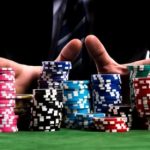
Contents
The possibility of becoming a professional poker player is an alluring one for most players. Let’s face it, who wouldn’t want to sit at home playing poker all day? My personal situation is such that the idea is especially appealing. I have a decent job, but nothing I would be reluctant to quit. I have no dependants, a very supportive family and a partner who earns enough to get me through the tough months if things went badly wrong.
In fact, in the last few months, I have been planning a possible career switch to professional poker. This isn’t an article about the pros and cons of playing poker for a living. Everyone should consider their own situation carefully before making such a decision. This article is a chronicle of an experiment I conducted, to see if I could handle the lifestyle of a professional poker player.
My One Week Experiment Turning Pro
I decided to spend one week as a pro. I took a week off work and planned to play poker as my ‘job’ for that week, playing the hours and times I would need to play as a professional player. I hoped that by doing this it might highlight any problems I would have and help me decide if playing full time was really for me. Amongst other things, I wanted answers to the following questions:
1. Could I physically play the hours? My normal sessions were 300-600 hands, and I would have to play for significantly longer than this at a time. Having to take excessive breaks would be inconvenient and time consuming.
2. How good are the tables during the day? Would my usual games be shark tanks during the daylight hours?
3. Would I have the discipline to play that many hands per day or would I get bored and want to do something else (especially when things were going badly)?
4. Would any other problems arise from playing so much poker? Would it make me moody, depressed or anti-social?
Obviously it was also important to work out how much money I could expect to make, and whether this would be a respectable income. Playing 5/10, I could play around 250 hands per hour, and my win rate is slightly above 1BB/100 over the last 40,000 hands. If I played 8 hours per day, that would mean I could play 2,000 hands per day and expect to make around $200 per day on average. If I played 20 days per month that would work out to an annual salary of around $50,000 per year, which is quite respectable when you consider that gambling winnings are not taxable in the UK.
Next I wanted to set myself specific hours to play. The best time to play is generally considered to be late night US time, but on the other hand I didn’t want to start at a time that was unrealistically early, that I would not be able to sustain in the long term. Eventually I settled on starting at 6am UK time, which is 1am EST and 10pm PST. That should give me at least a few hours of ‘prime time’ reckless play. I would then play until midday, by which time the poor players would probably all be gone. The last two hours I would play in the evening when the games had picked up again.
I felt this plan was reasonable and sustainable not only for this week but also if I played full time. I was as prepared as I thought I could be and was really looking forward to this week. Hopefully it would help make the decision of whether I could make it as a professional poker player.
10,000 Hands Played, Lessons Learned
I didn’t want this article to turn into a blog, and I certainly didn’t want to just go through each day saying how much money I won etc. In fact, the actual results I experienced were almost irrelevant to the experiment. For those who are interested though, here is a summary:
Monday +$750
Tuesday -$650
Wednesday +$200
Thursday +$900
Friday +$0
Overall +$1200
Given my BB/100 and the number of hands I played, this is pretty much average for the range of results we would expect. 10,000 hands is not a huge sample, so there was every chance I could have earned significantly more than this, or indeed significantly less. The important part of the experiment is what I learned from this week, and what it told me about playing professional poker.
Hours
I thought one of the most difficult parts of this experiment would be to play so many hours of poker in a day. As it turned out, this was not a huge problem. Once I got into a groove, the hands just seemed to fly by. On Tuesday I abandoned the idea of playing a long morning session and a shorter evening session, and just played 2,000 hands straight through.
Getting up so early was easy at first. I was highly motivated for this experiment and I couldn’t wait to get to the PC and start playing. Later in the week it got a lot harder. Wednesday was the first day where my alarm woke my up and I really felt like another hours sleep. I guess this was partly because the novelty had worn off and partly because I had taken a bit of a beating the previous day. In reality though I think getting up at 5:30 each day is something I would get used to.
On the other side of the coin, I was finished playing by 2pm at the latest. It was great to have the afternoons free, as in that time I could go to the gym, play games and watch DVDs, all guilt free as I had already done my days work. This is a fringe benefit of staying disciplined and getting up early, rather than using my flexible hours as an excuse to stay in bed until noon.
Taking Breaks
Scheduling breaks was a problem. Every time I took a break it seemed to take me a disproportionate amount of time to get back into the game. The 15-minute break I took for breakfast was long enough that I was kicked off the tables I was playing at, and so when I returned I needed to find good tables and wait for a seat all over again. Even a short toilet break meant I would need to wait for the blinds to get back to me. When I was targeting a set number of hands per day, this annoyed me no end. After all, time is money in this profession.
Unfortunately it is just one of those unavoidable evils. I think it is far better to take breaks when necessary and lose the time, rather than try to play through. You can only stay alert for a certain amount of time without a break, and if I tried to play the 2,000 hands without one, my game would deteriorate towards the end of the session. Missing a meal would also not help in this regard.
Breaks are just one thing I had to factor into my day. Fortunately I found that I could play more hands per hour than I thought and so I more than made up the time I lost in breaks. In fact, I actually finished before the scheduled 8 hours on most days. For anyone planning to play professionally, when you make your daily plan, make sure it accommodates breaks.
Discipline
I made a rule for myself at the start of the week that I would have no distractions. Internet and email would be off limits while I was playing, and I wouldn’t have the TV on in the background. I hoped that this would allow me to concentrate on the game better, and make better decisions.
This was actually quite a tough regime to stick to, especially towards the end of the session when I was looking forward to doing something else. However, I definitely noticed a difference playing in a more focussed disciplined manner. I was spotting things that I wouldn’t have noticed if I was surfing the net at the same time as playing. I was getting better reads on opponents, and was noticing betting patterns I otherwise might not have. I’m sure I won many extra bets and even pots because of it.
But discipline is not only about concentrating on the game, as I found out the hard way. On Thursday night I went out drinking, and this made Friday morning tough to handle. I had a bit of a hangover and was tired, which I’m sure affected my play. I got a lot of good hands in that time and suspect that I missed a lot of bets. That afternoon I then lost concentration completely. I guess like most people I am used to winding down on a Friday afternoon.
To play poker professionally you would need to be extremely disciplined. It doesn’t matter if I turn up to my current job with a hangover. I can keep a low profile and waste away the morning at my desk until I feel better. On a Friday afternoon it doesn’t matter that I am not concentrating, and am thinking about the weekend. Everyone in the office is the same and we can relax and put off any serious work until Monday. As a professional poker player you have to be on your best game all the time. Friday afternoon? Morning after a heavy night? Had a fight with your girlfriend? Your opponents have no sympathy and they will take your money just the same.
Game Quality
I was actually pleasantly surprised by the game quality at the time I was playing. I was expecting it to be good to start with, but then deteriorate rapidly as the morning went on. In fact, the games were normally okay right up until I finished playing; possibly better than my usual evening playing time in fact. There was a marked drop-off in the number of bad players at about 9am (4am EST) but it was not as severe as I imagined it would be.
However, that does not mean that the tables were definitively good. I found you had to keep changing tables to follow the bad players around and find new ones when they busted out. Parking yourself at a few tables and playing to the death would get you nowhere. I actually played on seventeen different tables per day on average.
Upswings and Downswings
Playing 2,000 hand sessions you start to see how meaningless the upswings and downswings over a small number of hands are. Every day of this week I had a period of 200-300 hands where I would win a large amount and another period where I would lose a similar amount. In fact on a typical day I would have multiple good and bad periods, plus periods where I stayed approximately where I was.
If you play a session of 500 hands or less then pretty much anything can happen. You are merely seeing what would be a small portion of one of my days during this week. Of course we all pay lip service to the notion that short-term results are not important, but this week I really felt it. By the end of the week, I found myself not really caring if I was winning or losing at any given moment. Only at the end of the day did I look at my results and see whether I had won or lost for the day, and feel a pang of happiness or annoyance.
I think that is an important attitude if I was to play professionally. There is no such thing as a ‘good session’ or a ‘bad session’ really, just sessions. As long as you play well in each session, everything follows from that. Eventually I would like to remove even that pang of happiness or annoyance at the end of the day.
Strange Streaks
With nothing to focus on but poker, my mind rebelled and started to notice strange streaks and occurrences. For example on Wednesday I noticed how few premium pairs I was getting. This bugged me until suddenly on Thursday I was inundated with them. I was actually dealt AA 18 times that day, far more than the statistical average should be.
I began noticing other streaks as well. On four out of the five days, I lost a lot of money in the last hour. Were the games getting tougher towards the end of my sessions? Not that I had noticed, and besides shouldn’t I still be able to play at least break-even poker against most players at this level? It seems that through playing for longer at a time, I was more prone to seeing strange patterns in random data.
Of course, with hindsight, these observations are strictly the results of the randomness of poker and nothing to worry about. When you look back on them it is easy to see this, although while you are actually experiencing them, it is much harder. If you are not careful, you find yourself second-guessing every strange pattern you see.
Tools of the Trade
Around 9am on Friday, my broadband connection died. The problem was not fatal, and I managed to fix it after about five minutes, but it hit home how fragile my setup was. I was relying on all components of my PC as well as my phone line, the local broadband exchange and my electricity supply in order to keep playing. In fact, play for long enough and it is inevitable that something will go wrong eventually, and it would probably be a lot worse than the 5 minutes of inconvenience I had on Friday. If I was to play online poker professionally, I think I would like a lot of redundancy in my systems.
At the very least I would either like a second broadband connection from a different company or somewhere else I could go to play (parents house or whatever). Also whatever redundant hardware you had lying around would be a plus. A second PC would be ideal, but if not, some spare components such as keyboard, mouse, graphics card and monitor would be helpful. It would be extremely annoying to fall behind on your hands because you were forced to go shopping for PC components during the day.
Conclusion
At the end of the week, I was forced to confront the question – do I want to be a professional poker player? This week opened my eyes to the highs and lows of such a lifestyle. I really enjoyed the week, and feel I coped quite well, but at the end of the day, it was just one week. In the back of my mind I knew that the following week I could go back to my desk in my little office and work for a steady paycheck. Could I play poker full time over a long period? I guess while this week was extremely helpful it didn’t fully answer this question. I guess nothing really would except for fully committing and going for it.
I hope this article helps you if you are considering playing poker full time. Good luck!
Leave a Review
Submit your review | |






